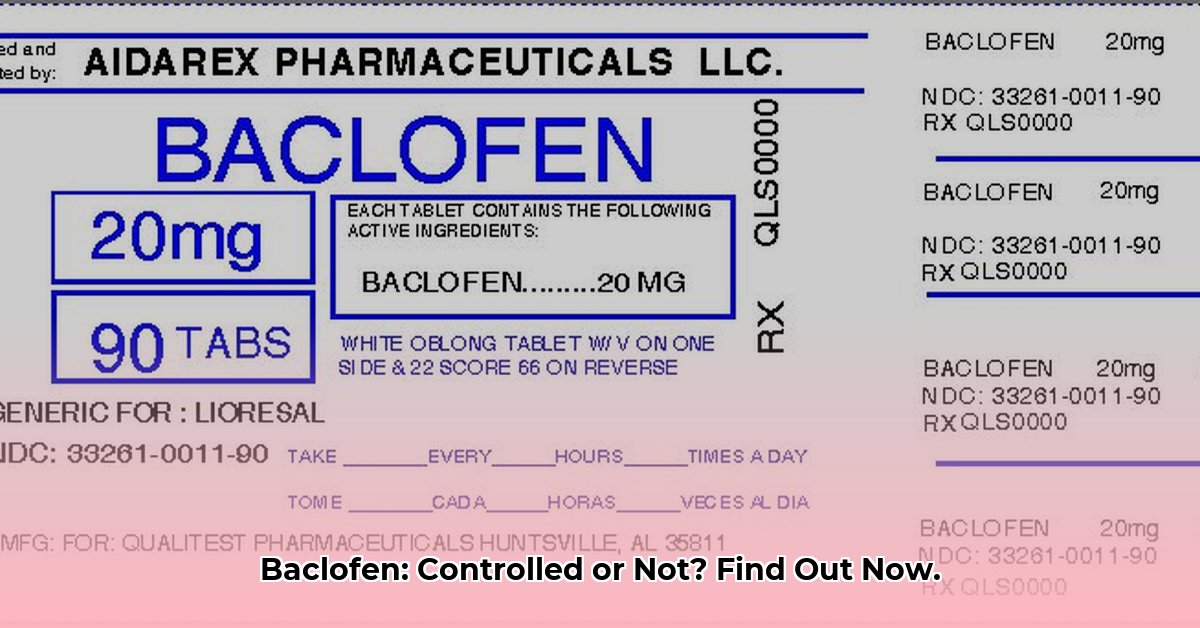No, baclofen is not a controlled substance. This means the Drug Enforcement Administration (DEA) does not classify it as a drug with a high potential for abuse or addiction. However, it’s still a prescription medication requiring careful medical supervision.
What Are Controlled Substances?
Controlled substances are drugs regulated by the government due to their potential for misuse and addiction. The DEA categorizes these drugs into five schedules (I-V) based on their potential for abuse and accepted medical use. Schedule I drugs (like heroin) have the highest potential for abuse and no accepted medical use, while Schedule V drugs have the lowest. Baclofen is not listed on any of these schedules.
Why Does Baclofen Require a Prescription?
While not a controlled substance, baclofen requires a prescription due to its potential side effects and the possibility of developing physical dependence. Medical supervision is necessary to determine the appropriate dosage and monitor for any adverse reactions. This also allows for safe and gradual tapering off the medication when necessary.
Physical Dependence vs. Addiction
It’s crucial to distinguish between physical dependence and addiction. Physical dependence occurs when the body adapts to a drug’s presence. Stopping the drug abruptly can lead to withdrawal symptoms. This doesn’t equate to addiction. Addiction involves a compulsive craving for the drug despite negative consequences, loss of control over its use, and continued use despite harm. While physical dependence on baclofen is possible, addiction is less likely, though still possible.
Baclofen Withdrawal: What to Expect
Abruptly stopping baclofen can lead to withdrawal symptoms, ranging from mild (anxiety, insomnia, muscle spasms) to severe (hallucinations, seizures, confusion). These symptoms underscore the importance of tapering off baclofen under a doctor’s supervision.
How Baclofen Works
Baclofen is a skeletal muscle relaxant. It acts on the central nervous system, specifically the spinal cord, by disrupting signals that cause muscle overactivity. This reduces muscle stiffness and spasms. While the precise mechanism isn’t fully understood, current research suggests it primarily affects GABA receptors, which play a role in inhibiting nerve signals.
What Is Baclofen Used For?
Baclofen is primarily prescribed to treat muscle spasticity caused by conditions such as multiple sclerosis (MS) and spinal cord injuries. It can also be used to treat other conditions causing muscle spasms. Research is ongoing to explore its potential use in other areas, such as treating alcoholism and gastroesophageal reflux disease (GERD), though more studies are needed to confirm its efficacy in these areas.
Side Effects and Precautions
Common side effects of baclofen include drowsiness, nausea, dizziness, and weakness. More serious side effects, such as seizures and hallucinations, though rare, are possible. It’s essential to discuss any pre-existing health conditions, other medications, or supplements you’re taking with your doctor before starting baclofen. This allows them to assess your individual risk factors and adjust the dosage accordingly. Baclofen may interact with other medications, particularly those that also affect the central nervous system.
Frequently Asked Questions
Are there alternative muscle relaxants?
Yes, several other muscle relaxants are available, some of which are controlled substances. Your doctor can help you understand the differences and recommend the most suitable option based on your individual needs. These might include tizanidine, cyclobenzaprine, or metaxalone. Each has its own set of potential benefits and side effects.
Does baclofen interact with other medications?
Yes, baclofen can interact with other medications, especially those that depress the central nervous system, like alcohol, antidepressants, and antihistamines. Always provide a complete list of your medications and supplements to your doctor and pharmacist to avoid potential interactions.
What if I miss a dose?
If you miss a dose, take it as soon as you remember. However, if it’s close to your next scheduled dose, skip the missed dose and resume your regular schedule. Never double up on doses.
Can baclofen be used during pregnancy or while breastfeeding?
The safety of baclofen during pregnancy and breastfeeding isn’t fully established. Some studies suggest a potential risk, while others have found no conclusive evidence of harm. It’s crucial to discuss the risks and benefits with your doctor if you’re pregnant, planning to become pregnant, or breastfeeding.
How long does it take for baclofen to work?
The onset of baclofen’s effects can vary depending on individual factors and the condition being treated. Some people may notice improvement within a few days, while others may take several weeks to experience the full benefits.
Can baclofen be used long-term?
Baclofen can be used long-term under medical supervision. Your doctor will regularly assess your condition and adjust the dosage as needed.
Disclaimer: This information is for educational purposes only and does not constitute medical advice. Always consult a qualified healthcare professional for any health concerns or before making any decisions related to your health or treatment. This article recognizes the limitations of current knowledge about baclofen’s effects and mechanisms, acknowledging that further research may lead to new understanding.
- Borosilicate Glass Meal Prep Containers Offer Durable Oven-Safe Storage - January 29, 2026
- Glass Storage Bowls With Glass Lids Offer Superior Freshness - January 28, 2026
- Rectangular Glass Food Storage Containers For Meal Prep - January 27, 2026










